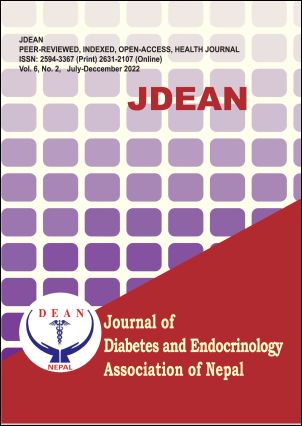Anxiety, Depression and Self-Care Management among Hypothyroidism Patients Attending Chitwan Medical College Teaching Hospital, Chitwan
DOI:
https://doi.org/10.3126/jdean.v6i2.52733Keywords:
Anxiety, depression, self-care management, hypothyroidismAbstract
Background: Thyroid dysfunctions have been recognized to cause significant manifestations in physical health as well as mental health. A descriptive cross-sectional research design was used to assess anxiety, depression and self-care management among hypothyroidism attending Chitwan Medical College Teaching Hospital (CMC-TH).
Methods: A total of 258 patients diagnosed with hypothyroidism were selected by convenience sampling. Data was collected from the date June 6, 2021 to November 17, 2021 using face to face interview schedule. The data was analyzed in SPSS version 20 using descriptive and inferential statistics was used to analyze the data.
Result: Out of 258 respondents females constituted 64% of the sample. A total of 72.1% of the respondents had different level of anxiety based on GAD-7 among them 43.8% of the respondents had mild anxiety and 9.3% severe level of anxiety. Regarding depression 60.1 % of the respondents had different level of depression based on PHQ-9. Among them 27.1% had mild level of depression whereas 4.7% severe level of anxiety. More than fifty percentages of the respondents (54.3%) had inadequate level of self-care management. Anxiety was significantly associated with sex (0.044), marital status (0.000) and family history of mental illness (0.009) whereas depression was significantly associated with educational status (0.009) and duration of illness (0.002).
Conclusion: It is concluded that anxiety and depression was more prevalent among hypothyroidism patients so, routine screening of hypothyroidism patients for psychiatric disorder and treating by both an endocrinologist and a psychiatrist in liaison with each other is very important to optimize their management and improve quality of life.
Downloads
Downloads
Published
How to Cite
Issue
Section
License
Copyright (c) 2022 D. Khanal, S. Chapagain, S. Thapa

This work is licensed under a Creative Commons Attribution-NonCommercial 4.0 International License.
This license enables reusers to distribute, remix, adapt, and build upon the material in any medium or format for non-commercial purposes only, and only so long as attribution is given to the creator.




